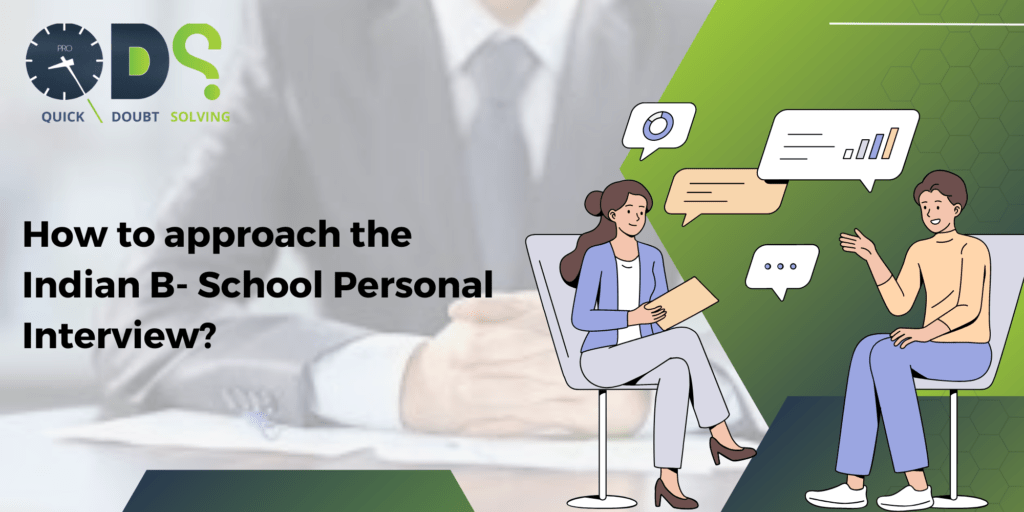MBA or b-school admissions in India are typically determined in addition to the candidate’s performance during graduation by the results of an entrance exam, group discussion/personal interview, and written aptitude test. Additionally, certain colleges like MDI Gurgaon, FMS Delhi, IIFT Delhi, JBIMS Mumbai, Xavier School of Management, and MICA Ahmedabad include a personal interview as an extra step in their MBA admissions process. In order to secure admission to B-School, candidates must successfully crack the personal interview round.

Tips for Prepare for your Business School Interview
Below are some valuable tips to help you prepare for your business school interview.
1. Specialist knowledge, professional experience, and current events.
One of the areas in which students are confronted with the most significant questions is directly related to the disciplines that they explored throughout their graduation, any past work experience, and the ongoings of the general world. The purpose of the questions that pertain to a candidate’s graduation subjects is to ascertain the reasons behind the candidate’s decision to pursue a specific course and to determine the extent to which the candidate understands the material covered in the course. This provides a glimpse into the level of dedication that the individual has towards their craft. Every big interview will include questions that are relevant to current events, and a candidate can get ready for these questions by reading the most recent news online or by reading newspapers two weeks before the interview.
In the event that a candidate has any prior employment experience, they may also be asked questions concerning that aspect of their background. In order to have a better understanding of the candidate’s knowledge regarding the sector and their job description, the interviewer can benefit from asking these questions.
2. Researching extensively may increase your ability to prepare.
Most business schools have a mission statement. It is important for candidates to familiarize themselves with the mission statement, as interviewers may inquire about it. This demonstrates the candidate’s strong commitment to securing admission to that B-school. It’s a good idea for the candidate to review the awards, recognitions, courses offered, and other achievements.
In a blind interview, the interviewer hasn’t thoroughly reviewed your application. When it comes to this situation, he’ll inquire about your goals, achievements, and interests. During a blind interview, it’s perfectly acceptable to reiterate the information already included in your CV. In a non-blind interview, the interviewer is already familiar with your application and will ask questions about topics that are not mentioned in your CV.
It is important for candidates to allocate some time to review their answers prior to the interview. Understanding the distinction between the two types of interviews can be extremely beneficial, as it allows candidates to anticipate the types of questions they may encounter.
3. Using body language and dressing well helps improve your initial impression.
Body language is a powerful tool that can provide valuable insights into a candidate’s personality during an interview. Simple gestures such as politely knocking on the door before entering, warmly greeting the panelists, and waiting to be asked before sitting down can greatly contribute to making a positive first impression.
It is important for a candidate to maintain eye contact with the interviewer while they are asking questions. It would be helpful if they could respond to the questions in the order they were presented. Being calm and composed while answering questions is crucial for the candidate. It’s important to approach this task with a positive attitude, as it can make a big difference.
It is crucial to dress appropriately for this interview. The clothes we choose to wear for different occasions can say a lot about our personality and how we view the event. For male candidates, a business suit or a formal shirt with trousers is appropriate attire. Female candidates should opt for a formal dress. The candidate should feel at ease with their choice of attire, and it’s recommended to keep makeup and accessories to a minimum.
4. Common Questions
During a personal interview, you can expect to be asked common questions like “Why this school?”, “What are your strengths/weaknesses?”, and “What are your career goals?”. It is recommended that you spend some time practicing these questions. Below, you’ll find a table with examples of frequently asked questions in personal interviews and their corresponding answers.
| Questions | Suggestion |
| What makes this school stand out? | Please provide a detailed explanation for your choice of B-School for admission. You have the option to compare the chosen business school with other reputable B-Schools. |
| What are your future plans? | Please provide details about your future plan, including your desired profession and the company you aspire to work for. To provide the best answer, it is important to consider the specific profile and industry you plan to pursue after completing your MBA. |
| What are your strengths/weaknesses? | When answering this type of question, it’s recommended to start by discussing your weaknesses before highlighting your strengths, allowing you to conclude on a positive note. It is important to consider the strengths and weaknesses that are most relevant to your chosen profile. |
| What is your motivation for pursuing an MBA? | Here, you must explain why you chose an MBA over other postgraduate courses. You might also discuss how an MBA can help you flourish in your chosen profession. |
| Introduce Yourself | For this type of question, you’ll need to provide information about your accomplishments, educational background, and personal interests. Feel free to share your hobbies and any significant personal information as well. |
Note:
A personal interview round holds significant importance for many b-schools, as they place greater emphasis on a candidate’s performance in this phase rather than solely relying on entrance exam scores.
During interviews, it’s common for interviewers to ask questions that challenge candidates and push them outside their comfort zone. It’s crucial for candidates to remain composed and provide logical and reasoned answers.
Presenting oneself with a smile, displaying good manners, and dressing well with confidence can greatly influence the atmosphere of a personal interview.



